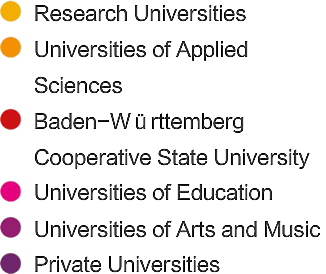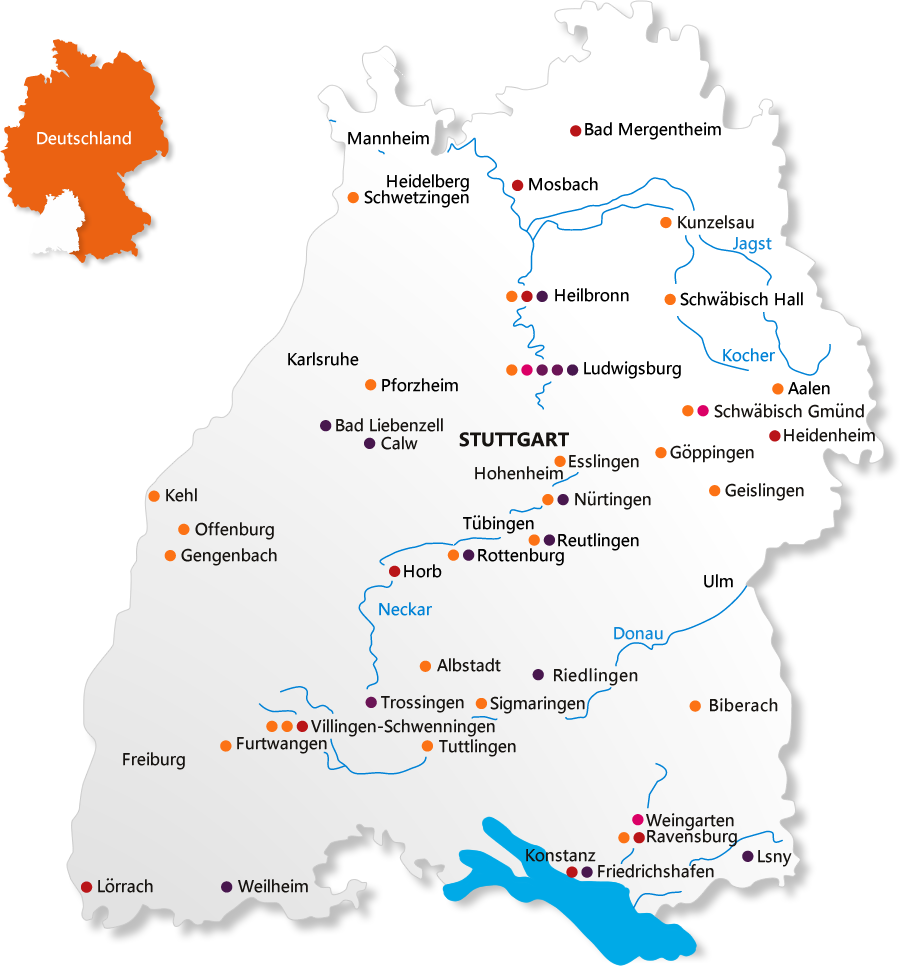-
Diversified higher education system
Baden-Württemberg offers the best possible prospects for studying. Research Universities, Universities of Applied Sciences, Baden-Württemberg Cooperative State University, Universities of Education, Universities of Arts and Music and private Universities have formed a diverse system of higher education in Baden-Württemberg.

-
The nine research universities are at the heart of Baden-Württemberg’s tertiary education. Three of Germany’s eleven Excellence Universities can be found in Baden-Württemberg: University of Heidelberg, University of Konstanz and University of Tübingen.
Universities of Applied Sciences build the state’s second pillar of education system. They have successfully combined academic education with practical training. The Baden-Württemberg Cooperative State University is the first and till now the only public university in Germany to offer dual study courses.
-
Six universities of education make Baden-Württemberg the only state in Germany to have specialized universities for educational sciences. Baden-Württemberg has the largest number of universities of arts and music in Germany. These universities cover a wide range of arts education, from music, dancing, through acting and film to fine arts and design. Beside public universities, there are more than 20 private universities in Baden-Württemberg. Most of them specialize in specific fields.
-

-
The distinguishing feature of the University of Mannheim is its clear focus on business studies and social sciences, while paying close attention to humanities, cultural studies, law, mathematics and computer sciences. The university establishes partnerships with 450 universities around the world and offers a number of international courses. The university not only offers traditional subjects, it is also known for its interdisciplinary and unique courses such as the bachelor's degree program in Culture and Economy.The University of Heidelberg is Germany’s oldest university and one of Europe’s leading research universities. Numerous great minds have learned and conducted research at Heidelberg University. It has thus played an important part in shaping science and society since its founding in 1386. Its courses include humanities, social sciences and law, natural sciences, life sciences and medicine. Many Bachelor’s and Master’s programmers are conducted in English, and its global research and teaching network encourages international exchange.
Karlsruhe Institute of Technology
In 2009, the Karlsruhe Institute of Technology (KIT) was formed through a merger of the Karlsruhe Research Centre and the University of Karlsruhe. The KIT is one of Europe’s largest research and teaching institutions. Education at KIT is aimed at qualifying young people by extensive scientific and research-oriented training and the acquisition of interdisciplinary competencies.The University of Stuttgart was founded in 1829. The faculty of aerospace engineering is one of the largest and best known in Germany. It is known for its good reputation in the fields of advanced automotive engineering, efficient industrial and automated manufacturing, process engineering and aerospace engineering. The University of Stuttgart offers an interdisciplinary approach, with a focus on the natural sciences and engineering, but also on architecture, economics, social sciences and humanities. It prepares its graduates for working in the global market by offering them opportunities to study abroad and an increasing number of English language Bachelor’s and Master’s degree courses.Founded in 1818 after a devastating famine, the University of Hohenheim is a university with a long tradition in the area of agriculture and natural sciences. The university is Germany’s leading university for agricultural sciences and it has an excellent global network. It has close ties with universities and other research institutions in more than 90 different countries. Hohenheim is also one of the top universities in rankings of courses in economics and communication sciences. The University of Hohenheim is divided into three faculties: Agricultural Sciences, Natural Sciences, Economics and Social Sciences. The three Faculties offer modern and forward-thinking degree programs.The University of Tübingen is one of Germany’s oldest. Many great intellectuals have studied and worked in Tübingen, including Kepler, Hegel, Hölderlin, and Schelling. At the University of Tübingen, students can choose courses in seven faculties offering 130 different subjects and more than 280 different courses, including fringe subjects with a long tradition such as rhetoric and indology.Ulm University was founded in 1967. It is one of Germany’s top new research universities. It maintains lively exchanges with famous research institutions and companies in Germany and abroad. Attractive and seminal courses, high standard of education, internationality and interdisciplinarity innovative research have become symbol of Ulm University. The University of Ulm specializes in medicine, natural sciences and engineering. It offers also a number of interdisciplinary courses, such as mathematical biometry, mathematics and economics and biochemistry. A number of courses are conducted in English.The University of Freiburg is one of Germany’s oldest and most famous universities located in the heart of the city of Freiburg. This university was founded in 1457. Many famous philosophers, top researchers, and Nobel laureates have taught and researched at the University of Freiburg. It offers a full range of subjects, of which many are conducted in English, including humanities, economics, natural sciences, engineering, medicine, law and theology. It also provides the ideal framework for undertaking modern, interdisciplinary studies.The University of Konstanz is one of Germany’s most successful universities. Since it was established in 1966, the University of Konstanz has distinguished itself through its top-level research, internationality and interdisciplinary collaboration. With over 250 partnerships with other universities, the University of Konstanz offers its students a wide range of exchange programs. The University of Konstanz offers more than 120 courses, including mathematics and natural sciences, humanities, politics, law and economics.
- University of Mannheim / 曼海姆大学
-
The distinguishing feature of the University of Mannheim is its clear focus on business studies and social sciences, while paying close attention to humanities, cultural studies, law, mathematics and computer sciences. The university establishes partnerships with 450 universities around the world and offers a number of international courses. The university not only offers traditional subjects, it is also known for its interdisciplinary and unique courses such as the bachelor's degree program in Culture and Economy.
- University of Heidelberg / 海德堡大学
-
The University of Heidelberg is Germany’s oldest university and one of Europe’s leading research universities. Numerous great minds have learned and conducted research at Heidelberg University. It has thus played an important part in shaping science and society since its founding in 1386. Its courses include humanities, social sciences and law, natural sciences, life sciences and medicine. Many Bachelor’s and Master’s programmers are conducted in English, and its global research and teaching network encourages international exchange.
- Karlsruhe Institute of Technology / 卡尔斯鲁厄理工学院
-
In 2009, the Karlsruhe Institute of Technology (KIT) was formed through a merger of the Karlsruhe Research Centre and the University of Karlsruhe. The KIT is one of Europe’s largest research and teaching institutions. Education at KIT is aimed at qualifying young people by extensive scientific and research-oriented training and the acquisition of interdisciplinary competencies.
- University of Stuttgart / 斯图加特大学
-
The University of Stuttgart was founded in 1829. The faculty of aerospace engineering is one of the largest and best known in Germany. It is known for its good reputation in the fields of advanced automotive engineering, efficient industrial and automated manufacturing, process engineering and aerospace engineering. The University of Stuttgart offers an interdisciplinary approach, with a focus on the natural sciences and engineering, but also on architecture, economics, social sciences and humanities. It prepares its graduates for working in the global market by offering them opportunities to study abroad and an increasing number of English language Bachelor’s and Master’s degree courses.
- Universit y of Hohenheim / 霍恩海姆大学
-
Founded in 1818 after a devastating famine, the University of Hohenheim is a university with a long tradition in the area of agriculture and natural sciences. The university is Germany’s leading university for agricultural sciences and it has an excellent global network. It has close ties with universities and other research institutions in more than 90 different countries. Hohenheim is also one of the top universities in rankings of courses in economics and communication sciences. The University of Hohenheim is divided into three faculties: Agricultural Sciences, Natural Sciences, Economics and Social Sciences. The three Faculties offer modern and forward-thinking degree programs.
- University of Tübingen / 图宾根大学
-
The University of Tübingen is one of Germany’s oldest. Many great intellectuals have studied and worked in Tübingen, including Kepler, Hegel, Hölderlin, and Schelling. At the University of Tübingen, students can choose courses in seven faculties offering 130 different subjects and more than 280 different courses, including fringe subjects with a long tradition such as rhetoric and indology.
- University of Ulm / 乌尔姆大学
-
Ulm University was founded in 1967. It is one of Germany’s top new research universities. It maintains lively exchanges with famous research institutions and companies in Germany and abroad. Attractive and seminal courses, high standard of education, internationality and interdisciplinarity innovative research have become symbol of Ulm University. The University of Ulm specializes in medicine, natural sciences and engineering. It offers also a number of interdisciplinary courses, such as mathematical biometry, mathematics and economics and biochemistry. A number of courses are conducted in English.
- University of Freiburg / 弗赖堡大学
-
The University of Freiburg is one of Germany’s oldest and most famous universities located in the heart of the city of Freiburg. This university was founded in 1457. Many famous philosophers, top researchers, and Nobel laureates have taught and researched at the University of Freiburg. It offers a full range of subjects, of which many are conducted in English, including humanities, economics, natural sciences, engineering, medicine, law and theology. It also provides the ideal framework for undertaking modern, interdisciplinary studies.
- University of Konstanz / 康斯坦茨大学
-
The University of Konstanz is one of Germany’s most successful universities. Since it was established in 1966, the University of Konstanz has distinguished itself through its top-level research, internationality and interdisciplinary collaboration. With over 250 partnerships with other universities, the University of Konstanz offers its students a wide range of exchange programs. The University of Konstanz offers more than 120 courses, including mathematics and natural sciences, humanities, politics, law and economics.
